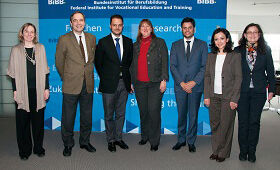BIBB and SENAI seek to expand their collaboration
The Brazilian National Service for Industrial Vocational Education and Training (SENAI) is planning to extend its provision of vocational education and training. The intention is to integrate elements of dual education and training, and, in this context, to update the statutory framework for vocational education and training in Brazil. The BIBB was asked to support this process in an advisory capacity. In addition to this, SENAI and BIBB are also seeking to refocus their collaboration.
On 23 March 2016, Frederico Lamego, head of the department for international collaboration at SENAI, and Wilson Lima, an expert at SENAI, visited the Federal Institute for Vocational Education and Training (BIBB). The meeting was used to exchange information regarding current reform proposals in Brazilian vocational education and training and to realign the collaboration of both institutes. “We want to renew the cooperation agreement and to structure it more specifically than before with a joint work plan,” explained the SENAI representatives. An existing institutional cooperation agreement has formed the basis of the current collaboration since 1998.
A key theme is likely to be the advice provided by the BIBB for the adaptation of the statutory framework to the extent that elements of dual education and training can be integrated in SENAI’s provision of vocational education and training. The legislation governing vocational education and training currently in place in Brazil has up to now limited the duration of education and training to a maximum of two years and places companies under an obligation to recruit employees for a minimum of one year following completion of their training. In the view of the BIBB, these points represent key challenges in the reform of the statutory framework because the way these are developed may provide momentum in generating acceptance for dual vocational education and training in the economy.
SENAI also identified other areas of activity for the collaboration in vocational education and training between Germany and Brazil.
- The experiences of Brazilian companies already engaged in dual education and training can be evaluated with the help of advice from Germany and then made more widely available.
- The intention is that a range of methods are trialled and will become established in SENAI using blended learning approaches. This is expected to involve the use of the latest information and communications media. The BIBB could provide support in the design and development of the approaches.
- In addition to this, the BIBB could also advise on the development of education pathways leading to master craftsperson, specialist and technician qualifications.
SENAI was formed in 1942 and is part of the National Association of Brazilian Industry (CNI). Brazilian industrial companies provide 75 percent of the financing. SENAI offers vocational education and training and continuing education and training courses for the industrial sector and cooperates with universities to support academic education and training in the industrial sector.
